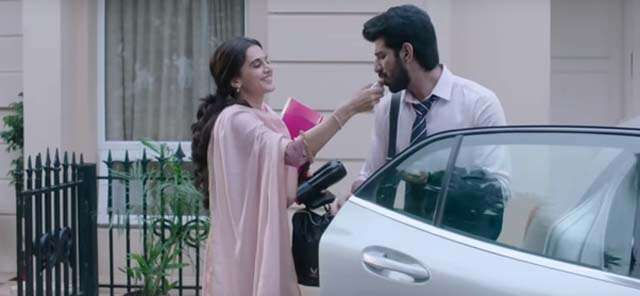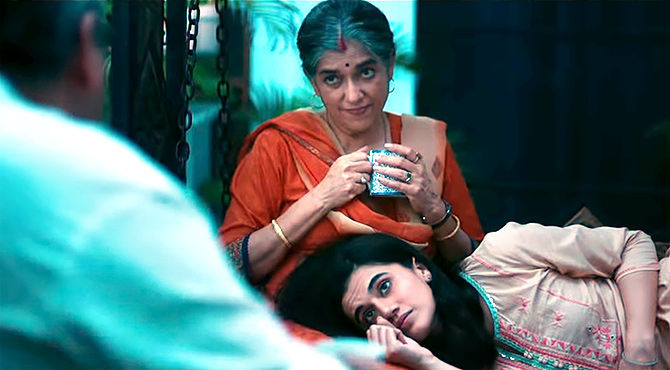A young homemaker who is happily going about her life is shaken to the core when a single slap by her husband makes her question everything existential in her marriage.

I had been waiting to watch Thappad ever since I saw its first trailer. Anubhav Sushila Sinha’s direction and story along with Mrunmayee Lagoo, Tapsee Pannu as a coy-looking protagonist, interesting casting in supporting roles, and the premise of “just one slap” to build a whole movie around - it was more than enough to intrigue me to wait for its release.
I liked the opening sequence of Thappad. A cheerful montage of various characters going about their lives who will later come together to build the story of the film. Even in those seemingly cheerful shots, we could see the premise already taking its shape. And that was one of the big strengths of this film, it is sharply focused on staying on point throughout, barring may be a couple of slips here and there.
Welcome to the world of Amruta aka Amu - the upper class homemaker by choice

A young, beautiful, healthy looking woman, presumably either in her late 20s or early 30s, is shown living a happy and settled life in her marital home in a posh Delhi locality. Her day starts early, at 6.00 AM, before everyone else in the house. She does a host of household chores in her busy mornings and the only moment that she steals for herself is the morning tea on her balcony, all by herself, with occasional pleasantries with her neighbor and friend, played by the beautiful and elegant Diya Mirza.
Then she prepares the bed tea-table and wakes up her “hardworking” husband, Vikram, played to perfection by Pavail Gulati. That follows with her struggling to make the perfect Aloo Parathas, again for her husband, almost every day. She doesn’t seem to get it right, like her mother-in-law and this seemingly harmless thing is used to beat her down occasionally throughout the film, sometimes by Amu herself and sometimes by either her mother-in-law or by her husband. So much so that he tells her something on these lines at a later point when things aren’t so good anymore:
“Ok, I made a mistake, I’m not perfect. You aren’t perfect either. Look, I agreed to marry you despite knowing that you couldn’t cook. And, I’m a foodie. Still.”
And he tells about this huge “sacrifice” or “understanding” or whatever the hell he thinks it is, when he is supposedly trying to apologize and to get her calm down in the aftermath.
And by the way, the apology never comes to Amu throughout the ordeal.

Well, coming back to Amu’s seemingly perfect and happy routine. After breakfast, the man of the house is getting ready to leave for work, and the women are running around to get his things and morning in order. Amu is behind him with all his things in tow - his bag, wallet, coffee etc. Amu is also Vikram's go to person when he has a big presentation to work upon, be it for taking print-outs or for the unending supply of coffee on a working night.
Amu is the thread keeping Vikram's life, home and to an extent even his career together. That's the polite way of saying it. Here's what I really want to say:
Amu is the glorified maid in Vikram's household who never gets even acknowledged forget about being appreciated (and of course not paid) for investing her whole life in making the lives of her family members.
Yes, I can't shy away from using the words glorified maid even if it might make you uncomfortable. I'm not seeking out to be politically correct here. Deal with it.
Calling out the fallacy of "a normal Indian household"
Everything about Amu's life and day are so normal. We all see it everyday in our lives, our mothers, wives, friends, colleagues life. This is the definition of a settled home and life. This is what we all are encouraged to aspire for in our country. The problem is with this normalcy and even glorification of misogyny, male entitlement, everyday sexism, gender-based discrimination and constant re-emphasis of stereotypes. That's what the film sets out to highlight by throwing this normalcy in our face.
On one of such mornings, when Diya Mirza’s character zooms by them in her new swanky car, this is the casual conversation between husband and wife:
“Arey, usne fir nayi car le li? Karti kya hai woh aisa?”, exclaims Vikram.
“Mehnat.”, pat comes the reply from Amruta.
Let’s translate it for our non-Hindi speaking readers.
“Hey, she bought a new car again? What does she really do?”
“Hardwork.”
Let’s pause here for a moment.
And then the dialogue between the husband and wife continues like this.
“I’m thinking that I should also learn driving”, Amruta says.
“You haven’t been able to learn how to make good Aloo Parathas, yet. First learn that.”
Yes, that’s Vikram’s reply.
Now, I can feel you gasping. I was gasping too, almost throughout the film.

So you get the drift. How casual and rampant everyday sexism is in our lives. And how well conditioned and unaware we all are towards it. And yes, we all are culprits in it together. The men, the women, the mothers, the fathers, the husbands, the wives, the brothers, the boyfriends, the mother-in-laws and every one of us.
Indian families are misogynistic, deep in discrimination, extremely mean towards its female members, and are outright sexist in their fabric. And we all are both partners in and victims of this crime.
Yes, there, I said it. You can argue that if you want, saying that it's a huge generalization. But can we really argue the truth of this?
That’s the point the film drives home and that’s why it works for me. We’re hurting ourselves and we’re hurting each other. And we might be doing it - unintentionally, unwittingly or even unwillingly. Maybe 'coz we don’t know any better, maybe ‘coz we’ve not been told any better. Maybe ‘coz sexism is so normalized in our lives that we can’t even see it.
Sexism hides in plain sight in our everyday lives.

But when we’re brutally brought face to face with the ugly realities and the extent of how awful it could get, then only we fully realize it, because we’re finally shaken to our core. Like how Amu finds it, when she is slapped by her husband. Otherwise, she doesn’t even blink when her house-help Sunita, brilliantly played by Geetika Vidya Ohlan, tells her about her brutal domestic beatings almost everyday.
A slap not on Amruta's face, but really on all of our faces - one that is so badly needed
I could go on and on about how Thappad works for me, mainly because it’s an important film of our times, one that highlights casual sexism and for driving the point that domestic violence can’t be accepted even if it’s just one slap.
Like Amu keeps repeating and stands by through the story, “Yes, it’s just a one slap. But nahi maar sakta. (but he can’t do that).”
Is Thappad flawed? Yes, it is. At some points, even deeply so. I just can’t wrap my head around the whole pregnancy, and pooja and the good old bahu routine even after all that happened. It just made me want to barf to the end of my wits. It truly was the bigger wtf moment for me even than when Amu is slapped hard in her face.

But it does a fine job of portraying how a typical life of a typical woman is in our country, even in educated and affluent sections of society. Our society might have progressed and become educated in a lot of ways. But we have a really long way to go as a society and as human beings when it comes to gender equality. We need to be shown these kinds of mirrors to our face, again and again till we realize the full extent of the deeply rooted problems.
We still have women like Amruta, who happily go about the life that they think they have chosen for themselves, even well-educated and strong women raised in metro cities. There is no dearth of entitled husbands like Vikram who think that they are the center of universe, and that they can just walk all over everything and everyone that comes in the way of their giant ego, who think it’s OK to slap their wives, and then not even once apologize for it.

Our moms still teach us that our home comes above everything, even above our own being as a human being and that it always falls upon the women to sacrifice to keep the status quo going. And mother-in-laws don’t think twice before expecting their daughter-in-laws to just brush aside the humiliation and pain that was inflicted upon them by their sons, literally minutes ago, so that they can go back to the house party, keep entertaining the guests like nothing really has happened.
All of this very much exists, we’re all of these people, we’re this society and there is no point in running away from it and to keep thinking that we’re the elite people, and that regressive atrocities only happen to the marginalized, far removed from our privileged lives. The director achieves what he sets out to, by showing everything as it happens in life, sans the cinematic drama, and with awe-inspiring restraint shown by every member of the cast, the writer and the film-makers.

Thappad stays with you, makes you think hard and for long. It makes you uncomfortable and makes you cringe. It might not be perfect, and it doesn’t need to be. It does the important job of chronicling the lives of its characters the way it intends to. It wins as a film, as a story, and as an important step towards making true slice-of-life dramas in our popular entertainment. It needs to be watched and deliberated upon for what it is trying to say and show.
Have you watched Thappad yet?
No?
Go watch it now.
Yes?
Share with us, how it made you feel? Leave a comment.

Comments